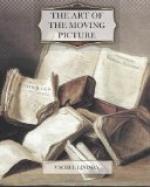The Intimate Photoplay should not crowd its characters. It should not choke itself trying to dramatize the whole big bloody plot of Lorna Doone, or any other novel with a dozen leading people. Yet some gentle episode from the John Ridd farm, some half-chapter when Lorna and the Doones are almost forgotten, would be fitting. Let the duck-yard be parading its best, and Annie among the milk-pails, her work for the evening well nigh done. The Vicar of Wakefield has his place in this form. The Intimate-and-friendly Motion Picture might very well give humorous moments in the lives of the great, King Alfred burning the cakes, and other legendary incidents of him. Plato’s writings give us glimpses of Socrates, in between the long dialogues. And there are intimate scraps in Plutarch.
Prospective author-producer, do you remember Landor’s Imaginary Conversations, and Lang’s Letters to Dead Authors? Can you not attain to that informal understanding in pictorial delineations of such people?
The photoplay has been unjust to itself in comedies. The late John Bunny’s important place in my memory comes from the first picture in which I saw him. It is a story of high life below stairs. The hero is the butler at a governor’s reception. John Bunny’s work as this man is a delightful piece of acting. The servants are growing tipsier downstairs, but the more afraid of the chief functionary every time he appears, frozen into sobriety by his glance. At the last moment this god of the basement catches them at their worst and gives them a condescending but forgiving smile. The lid comes off completely. He himself has been imbibing. His surviving dignity in waiting on the governor’s guests is worthy of the stage of Goldsmith and Sheridan. This film should be reissued in time as a Bunny memorial.
So far as my experience has gone, the best of the comedians is Sidney Drew. He could shine in the atmosphere of Pride and Prejudice or Cranford. But the best things I have seen of his are far from such. I beg the pardon of Miss Jane Austen and Mrs. Gaskell while I mention Who’s Who in Hogg’s Hollow, and A Regiment of Two. Over these I rejoiced like a yokel with a pocketful of butterscotch and peanuts. The opportunities to laugh on a higher plane than this, to laugh like Olympians, are seldom given us in this world.
The most successful motion picture drama of the intimate type ever placed before mine eyes was Enoch Arden, produced by Cabanne.
Lillian Gish takes the part of Annie, Alfred Paget impersonates Enoch Arden, and Wallace Reid takes the part of Philip Ray. The play is in four reels of twenty minutes each. It should have been made into three reels by shortening every scene just a bit. Otherwise it is satisfying, and I and my friends have watched it through many times as it has returned to Springfield.




